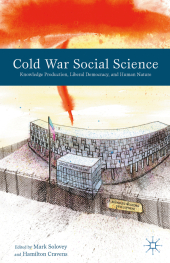 Neuerscheinungen 2014Stand: 2020-02-01 |
Schnellsuche
ISBN/Stichwort/Autor
|
Herderstraße 10
10625 Berlin
Tel.: 030 315 714 16
Fax 030 315 714 14
info@buchspektrum.de |

Hamilton Cravens, Mark Solovey
(Beteiligte)
Cold War Social Science
Knowledge Production, Liberal Democracy, and Human Nature
Herausgegeben von Solovey, M.; Cravens, H.
2012. 2014. xvii, 270 S. 3 SW-Abb. 216 mm
Verlag/Jahr: SPRINGER PALGRAVE MACMILLAN; PALGRAVE MACMILLAN US 2014
ISBN: 1-13-738835-8 (1137388358)
Neue ISBN: 978-1-13-738835-3 (9781137388353)
Preis und Lieferzeit: Bitte klicken
´"The book offers a diversity of topics often missing in the study of cold war social science. ... The volume also looks at supporting agencies and early research centers. I recommend this book to students of science, particularly for chapters like those on decision science and creativity." (Benoît Godin, Technology and Culture, Vol. 56, 2015)"The advanced student and the interested reader will find the book to be a useful road map to some great work in the history of social science. Its contribution to scholarship is to sharpen our attention to the limits of the Cold War thematic. It counters narratives of national security state oppression and social-science cooption in favour of accounts that situate social science in overlapping institutional environments and traditions, ultiple time frames, and negotations between a multitude of actors. Its sober message is worth listening to." - The British Journal for the History of Science"Rich and varied . . . these studies together reveal the broad diversity of social science organization and research under Cold War conditions and exigencies: scholars as servants of power; theorists of imperiled democracy and individuality; and innovators in the management of research data, machines, organizations, and polities." - The Journal of American History"The book sheds light on a number of contexts that are relevant to study the work, commitments, and ambitions of the post-war American social scientists. It is fair to say that as much as the Second World War marked the consecration of a natural scientific and engineering culture, the Cold War era marked the affirmation of a social scientific culture. That this book helps us see more clearly its defining characteristics is already a significant achievement." - Journal of the History of Economic Thought"Cold War Social Science is a formidable collection marked by impeccable scholarship, compelling argument, limpid prose, original ideas, and continuing relevance." - Regional Studies"In connecting issues of knowledge and power to questions of human nature, the essays in this volume often unknowingly suggest possibilities for moving beyond the facile distinctions between repressive and emancipatory social science that have shaped the critique and defense of social science since the era of the cold war." - U.S. Intellectual History"The structure of this volume encouraged me as a reader to think acutely about the connections between the social sciences . . . There are too many strong chapters in this book to list." - blogs.lse.ac.uk"Solovey is certainly right to observe that there has been recently renewed interest in ´Cold War social science´ . . . A few essays seem to me to take this enterprise some steps forward." - Cold War History"In this ambitious volume, leading historians assess the shared moves - intellectual, institutional, political - that characterized the social sciences in Cold War America. Engaging examples range from area studies to linguistics, psychology to economics, each grappling with hard questions about military patronage and the tensions between pure and applied research. Authors reveal important continuities to earlier periods even as they hone in on what was special about the bounded historical moment of the Cold War. A must-read for anyone interested in relations between knowledge and power and the changing place of the academy in American life." - David Kaiser, Germeshausen Professor of the History of Science, Massachusetts Institute of Technology"This exciting collection proves that the history of Cold War social science has come of age. It is at once a collection of fascinating case studies and a volume that probes the big questions about science and politics. To what extent did Cold War imperatives shape knowledge about social relations, cultural difference, individuality, human nature, motivation, and
From World War II to the early 1970s, social science research expanded in dramatic and unprecedented fashion in the United States. This volume examines how, why, and with what consequences this rapid and yet contested expansion depended on the entanglement of the social sciences with the Cold War.


